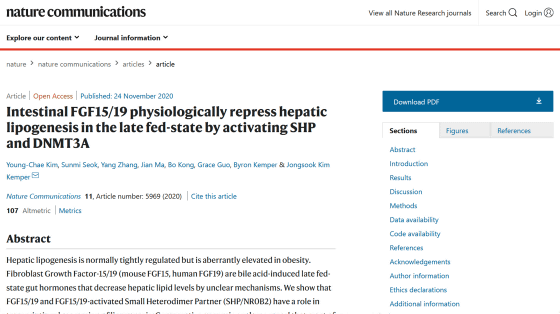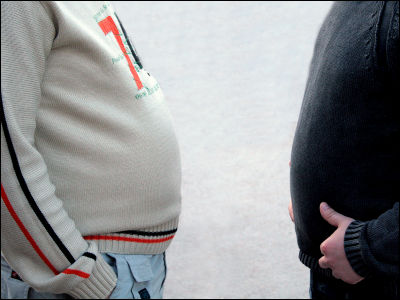A mechanism by which intestinal hormones regulate liver function to prevent excessive fat accumulation is discovered

Researchers at the University of Illinois at Urbana-Champaign have discovered a mechanism by which intestinal hormones act on the liver to regulate fat production so that excess fat does not accumulate in the body after a meal. It is said that this mechanism does not work well in obese mice and people with non-alcoholic fatty liver disease , and it may be useful for future treatment development.
Intestinal FGF15 / 19 physiologically repress hepatic lipogenesis in the late fed-state by activating SHP and DNMT3A | Nature Communications
https://www.nature.com/articles/s41467-020-19803-9

Study: Gut hormones' regulation of fat production abnormal in obesity, fatty liver disease | Illinois
https://news.illinois.edu/view/6367/1948733727
New Mechanism Halts Fat Production After Eating | IE
https://interestingengineering.com/new-mechanism-halts-fat-production-after-eating-could-treat-obesity
When you eat, your body's metabolic system becomes active, digesting food and trying to get energy. As part of this, the pancreas produces insulin , which converts digested food into fat and accumulates it in the body. There is a process called lipogenesis (lipogenesis) that triggers the liver's function.
It has long been known that a few hours after the last meal, the body goes into fasting mode, slowing the production of fat in the liver. However, the process by which lipid production is turned off has not been known so far.
To study the molecular and integrated physiology at the University of Illinois at Urbana-Champaign Jongsook Kim Kemper and his colleagues research team, in the mouse FGF15 is known as, the human FGF19 gut hormone known as is, to turn off the lipogenesis in the liver I found that I would. The researchers say that FGF15 / FGF19 activates a regulatory molecule called a small heterodimer partner (SHP) and suppresses gene expression in lipid-producing cells.

For example, it is necessary for the body to release insulin immediately after eating a cookie and promote lipid production, but if a few hours have passed since eating the cookie, lipid production continues. , Excess fat will accumulate. In order to prevent this, the intestines release FGF15 / FGF19 when shifting to the fasting mode several hours after eating, and it is said that the mechanism is to suppress lipid production. 'This intestinal hormone actually acts as a breaker in insulin activity, specifically inhibiting and tightly regulating lipid production in the liver,' said Professor Kemper.
In addition, the research team conducted experiments in obese mice and humans with non-alcoholic fatty liver disease to investigate the function of FGF15 / FGF19. Then, it was found that in obese mice and patients with non-alcoholic fatty liver disease, the function of SHP activated by FGF15 / FGF19 is insufficient, and the suppression of gene expression does not work well.
'This study reveals a mechanism that turns off lipid production and provides a better understanding of obesity, non-alcoholic fatty liver disease, and other metabolic disorders. Obesity is a risk factor for diabetes and certain specific disorders. This study may also have implications for diseases such as cancer, 'said Professor Kemper, suggesting that it could lead to the development of treatments that target this mechanism.

Related Posts:
in Science, Posted by log1h_ik







